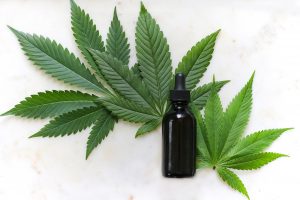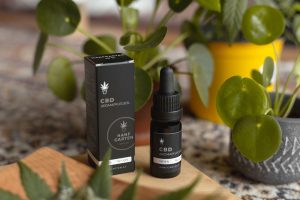The PR of CBD
Published on October 24, 2019, at 12:11 a.m.
by Christina Guyton.
Cannabidiol, or more commonly referred to as CBD, is cropping up everywhere and in everything. From beauty salves to lattes, THC’s non-psychoactive sister has generated a lot of buzz in the past year. Following the 2018 Farm Bill’s legalization of hemp, CBD companies were able to sell their products, but not without caveats and constraints.
Public relations professionals tasked to flourish the reputation of both companies selling CBD and its related products have a difficult job, with many unknowns.
Durée Mellion Ross is the president and CEO of public relations agency Durée & Company, with offices in Fort Lauderdale, Florida, and Aspen, Colorado. She pointed to the newness of the industry as both an opportunity and a disadvantage.
“Really never in my lifetime, aside from high-tech, has there been a completely new industry. It’s very challenging because there’s a lot of things up for interpretation,” Ross said.

Ross noted the overall lack of knowledge surrounding CBD — including the legalities, uses and side effects — as a hurdle, a combination that forces the agency to be extremely mindful and strategic in its messaging for clients.
“On the PR side of CBD, there’s no handbook to follow,” Ross said. “Never in the history of my career have I ever represented a product, good or service that when we’re pitching media they say ‘Oh this is so cool, what can I use it for?’”
She contrasted the CBD industry to that of cars, a product familiar to everyone. From maker to maker, the question surrounding brand reputation is “why are our cars the best?” Conversely, CBD companies must first explain what their product is, before claiming that they’re the industry leader.
Furthermore, there are restrictions as to what can be said regarding the capabilities and benefits of the so-called miracle product: “We can’t make any claims; we can’t even insinuate anything,” said Ross.
Caitlin Sherwood is an account director at wellness-focused marketing agency Room 214 in Boulder, Colorado. She handles many CBD clients, and said, “It’s a confusing thing to educate on because there are so many different use cases and also so much regulation around what you can say … You might hear one thing from your friend, but the company says, ‘We can’t say that.’ It creates a confusing situation for the consumer.”
Relying on personal testaments and hearsay, instead of straight-forward, research-based messaging, does not allow PR practitioners to control the landscape for their clients.
Due to a lack of solidified medicinal research to support any claims, and the well-established pharmaceutical industry as a direct competitor, people can sometimes question the validity of CBD. Their health care professionals will offer prescription drugs as a cure to ailments like anxiety or chronic pain, rather than CBD.
Sherwood said that the developing bad reputation surrounding big pharmaceutical companies is an opportunity for CBD to prosper: “What we found is, that on both ends [of the political spectrum], people are fed up with pharma … Maybe they’ve tried a few things, and either those things didn’t work or they had really bad side effects, or they just had a bad experience with their doctor not listening to them, because our doctors are unfortunately spread so thin; [patients] feel a little burned and they want to take matters into their own hands.”
Sherwood continued, “We all want the same thing: We all want to live healthily and be healthy and live a really enjoyable life, and also be in control of our own health and our own bodies. I think we’re seeing this grassroots movement for hemp coming out of that, and people actually looking for an alternative from pharma.”

In addition to the limitation of validated claims, CBD product promotion is restricted on sites like Facebook and Pinterest, which makes it difficult for PR practitioners to secure paid media for their clients. Regarding earned media, Sherwood said that “we do often see incorrect information coming out in press; that’s really where we start to see the negative impacts of PR.” For example, reputable news outlets have claimed CBD is illegal, contributing to an unfavorable reputation for CBD. From a PR perspective, it is important to work with journalists, who also need to be educated about CBD, as a means to combat the perpetuation of any negative connotations.
Luckily, Ross said there’s a “natural curiosity” revolving the wonder-remedy. The cultural phenomenon aspect of CBD is one of the strongest allies when bolstering the approval of the commodity. Capitalizing on publicity like Kim Kardashian’s CBD-themed baby shower, keeps the product at the forefront of target audience’s consideration: “Those types of opportunities at least bring it into a conversation for people,” said Ross.
PR firms are likely to have multiple CBD clients, especially at the rate of increase of the market. It’s important to maintain a separate voice for each client, creating messaging specific to its respective sub-industry like beauty or wellness.
Regardless of the product’s specificities, each company must have authority in its field. Ross asserted, “We must position our clients as the expert in their space,” a statement that rings true for any client regardless of industry, but especially for CBD companies navigating new territory.
PR firms and practitioners are in high demand amongst CBD companies. Many are desperate for support in order to stand out in an already congested industry. Sherwood said, “They’re faced with a lot of regulation and a lot of difficulties and because of that they’re looking for third-party support … for fuel to add to the fire to keep their company growing.”
Both women pointed to education as their most important job. Educating themselves and their teams, as well as journalists and consumers, is instrumental in the trajectory of CBD. Sherwood concisely noted, “Education is everything here, making sure that the education stays up to date because the market is changing so fast, the landscape is changing fast, regulation is changing fast.”
As the CBD market continues to burgeon, and research, support and education progress, PR professionals will gain more tools to groom positive and effective messaging to create success and ultimately ameliorate CBD’s brand reputation. A PR practitioner’s flair for framing will be pivotal in positioning represented CBD brands as a must-have cure-all.




